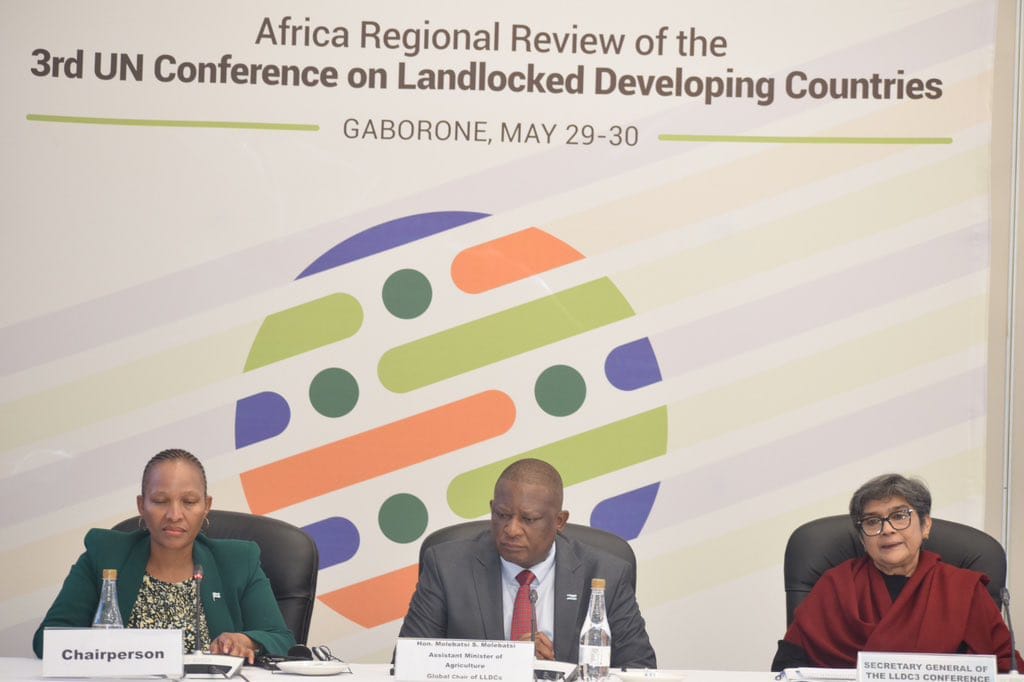UN-OHRLLS Assesses Progress for African LLDCs
UN-OHRLLS assesses progress of 16 African LLDCs in Botswana, writes Matiisetso Mosala.
GABORONE, Botswana — The United Nations Office of the High Representative for the Least Developed Countries, Landlocked Developing Countries, and Small Island Developing States (UN-OHRLLS) is currently in Botswana assessing progress for 16 African LLDCs against their development ambitions, writes Matiisetso Mosala.
UN High Representative Rabab Fatima opened the Africa Regional Review of the Third UN Conference on Landlocked Developing Countries on Monday, noting that they will be plotting a path forward for LLDCs.
The Africa Region Review will feed into the Third UN Conference on Landlocked Developing Countries to be held in 2024, in Kigali, Rwanda, aimed at opening opportunities to explore innovative solutions and build meaningful partnerships to unlock the potential of landlocked developing countries.
This follows the 5th UN Conference in the Least Developed Countries held in Doha, Qatar, in March.
UN-OHRLLS’s Fatima said as preparations for the 3rd UN Conference on LLDCs are underway, the stake for Africa is very high, highlighting that half of the LLDCs are from Africa and that it is the first time that the LLDC conference is being held in Africa.
“Africa must leverage the once-in-a-decade opportunity for mobilising global support and solidarity to strengthen partnerships to transform the lives and livelihoods of 533 million people in 32 landlocked countries,” Fatima emphasised.
Botswana’s assistant minister of agriculture, Molebatsi Molebatsi, addressing the High-Level Africa Regional Review of the Vienna Programme of Action (VPoA) said LLDCs should not be left behind in sustainable development but that they need financing for better connectivity to implement the Programme of Action.
He called for the successor Programme of Action of the VPoA to be an accelerator to achieve the Sustainable Development Goals (SDGs), indicating that Africa’s landlocked countries are locked out of global trade.
The UN Economic Commission for Africa (ECA)’s Acting Executive Secretary Antonio Pedro said issues related to Africa’s LLDCs are a priority and a central focus of the ECA given the number of countries and size of the African population that risk being left behind if they do not receive continued special attention.
He noted that despite the challenges LLDCs have faced, they have increased their economic growth and increased the number of internet users from 29 percent in 2019 to 35 percent in 2021, while also increasing the population with access to electricity from 24 percent in 2014 to 37 percent in 2020.
Pedro challenged Africa to find alternative and innovative financial sources for the implementation of the VPoA for the decade 2014–2024.
The Acting Executive Secretary further said that with a projection of 2.9 billion inhabitants in 2050, and a production of 100 million new jobs, Africa’s population is growing faster than its capacity to create jobs, reasoning that if it is not addressed, it could be detrimental.
“Sustainable solutions lie in well-targeted capital investments, both physical and human, and policies fostering competitiveness and productivity to empower Africa’s large and young workforce to transform the continent,” Pedro said, arguing that the African Continental Free Trade Area (AfCTA) could be Africa’s Marshal Plan to foster development and boost job creation.




Where not already in place LLDCs with contiguous borders should have financing provided for connection one with another or neighbouring non LLDCS. This should include road, rail and air linkages also. These connections should be given funding for implementation and publicity of the devellopment opportunities they represent.